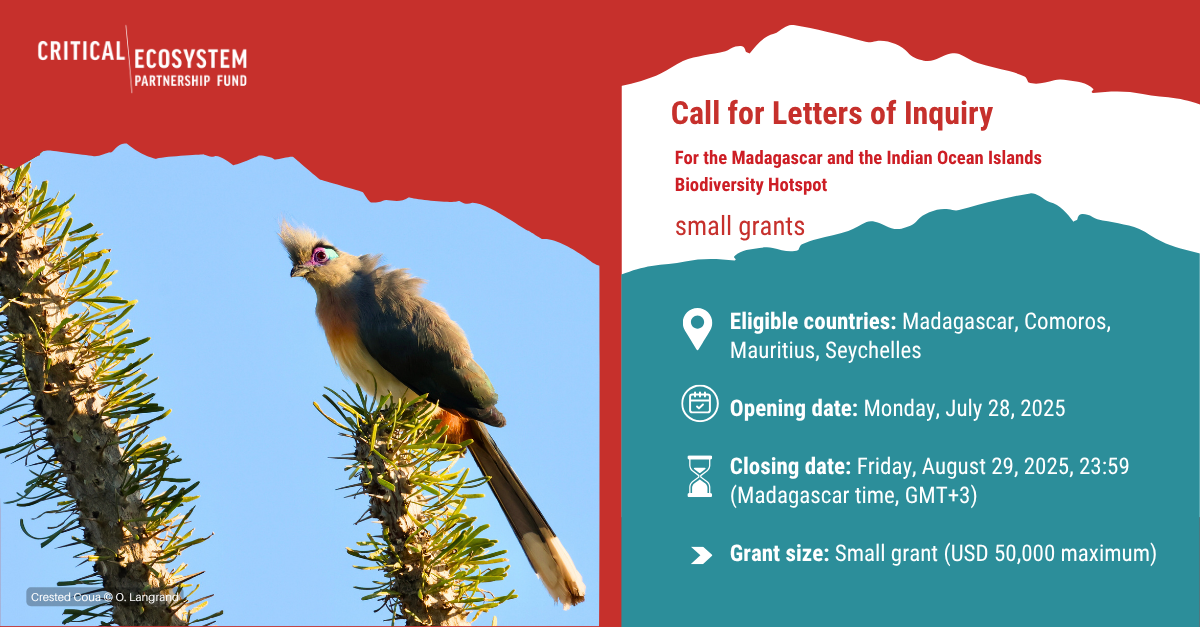The Critical Ecosystem Partnership Fund (CEPF) and its Regional Implementation Team (RIT) are releasing a call for Letters of Inquiry (LoIs) for projects that address the conservation of biodiversity in light of climate change in the Madagascar and the Indian Ocean Islands Biodiversity Hotspot, and that meet the criteria set out in these calls.
Please read carefully the detailed instructions, criteria and restrictions in the Call for LoIs for your country of interest, available further below. Requirements and dates vary per country.
Due to limited funding remaining on our current allocation for this investment phase, note that a very limited number of projects will be selected as part of this call.
- Eligible countries: Madagascar, Comoros, Seychelles, Mauritius
- Opening date: Monday, July 28, 2025
- Closing date: Friday, August 29, 2025, 23:59 (Madagascar time, GMT+3)
- Grant size: Small grant (USD 50,000 maximum)
Technical scope of the call
For Mauritius:
Investment Priority 1.1: Implement EbA actions, including agroforestry, “climate smart agriculture”, eradication of IAS, restoration of degraded watersheds and coastal ecosystems (including wetlands, mangroves, reefs and seagrass beds), and promotion of sustainable management of coastal and terrestrial ecosystems.
Projects submitted under Investment Priority 1.1 must contribute to some of the following CEPF objectives:
- 16,500 women and 16,500 men with increased income as a result of ecosystem-based livelihood activities (sustainable fishing, nature-based tourism, harvesting natural products, etc.).
- 1,000 hectares of small island ecosystems where invasive alien species have been eliminated or reduced.
For Madagascar, Comoros, Seychelles and Mauritius:
Please read carefully the detailed instructions, criteria and restrictions in the Call for LoIs for your country of interest, available further below. Requirements and dates vary per country.
Investment priorities:
- Investment priority 2.3: Support civil society in the development and implementation of disaster risk reduction measures.
- Investment Priority 3.3: Support the emergence of a new generation of conservation professionals and organizations specializing in biodiversity conservation, ecosystem services and climate change by supporting, with small grants, technical and practical training and exchange visits.
How to apply?
Applications for small grants can be written in English or French. Please download the LoI and budget templates, or fill in the online form directly (preferred).
Any changes to the LoI and budget templates will render the application ineligible.
Applications must be submitted by filling in the online form directly (preferred) or as a Word document (for the LoI) and as an Excel sheet for the budget (in case of poor internet connection) to cepfproposals@iucn.nl no later than Friday, August 29, 2025, 11:59 pm (Madagascar time, GMT+3), indicating the following e-mail subject:
LOI_2/2025/SG_CEPF_”COUNTRY”/”your organization”.
For example: LOI_2/2025/SG_CEPF_MADA/IUCN NL
- English: Sample letter of inquiry and Sample budget / Online form
- French : Sample letter of inquiry et Sample budget / Online form
Letters of intent submitted after the deadline or in another language will not be eligible.
More information
- Ecosystem profile: English or French
- Ecosystem-based adaptation in the Indian Ocean: English – French
Additional Resources:
- Before You Apply
- 12 Tips for Getting Your Grant Idea Funded
- CEPF Gender Toolkit
- Information on Nature-based Solutions
- Information on ecosystem-based adaptation
Frequently asked questions:
We’re receiving questions from potential applicants on a regular basis. For transparency purposes, all incoming questions and our answers are published on this website in English and French and will be updated on a regular basis (most recent update: 30 July 2024).
Regional Implementation Team
CEPF has enlisted a consortium of nongovernmental organizations to be its regional implementation team (RIT) in the hotspot. Coordinated by IUCN NL, the RIT includes SAF/FJKM for Madagascar, ID-ONG for Comoros, FORENA for Mauritius and SeyCCAT for Seychelles. These organizations are working with CEPF to implement a five-year conservation strategy for the hotspot and build local civil society capacity. The RIT can be reached via the following email address: cepfproposals@iucn.nl.

